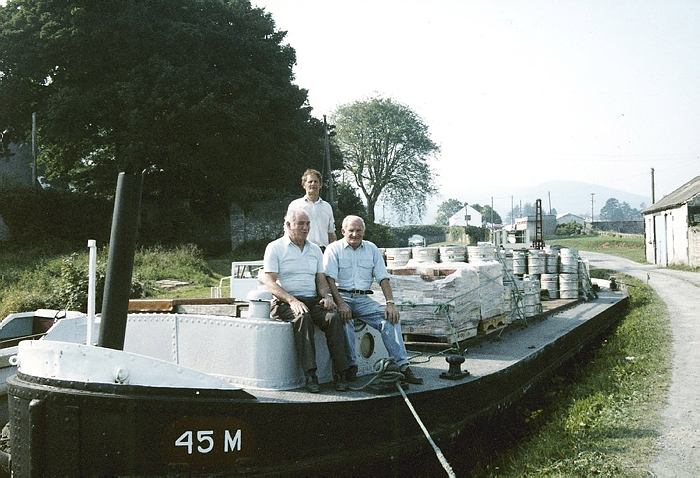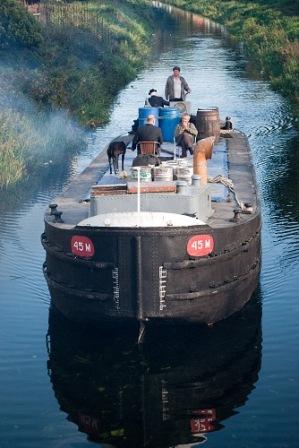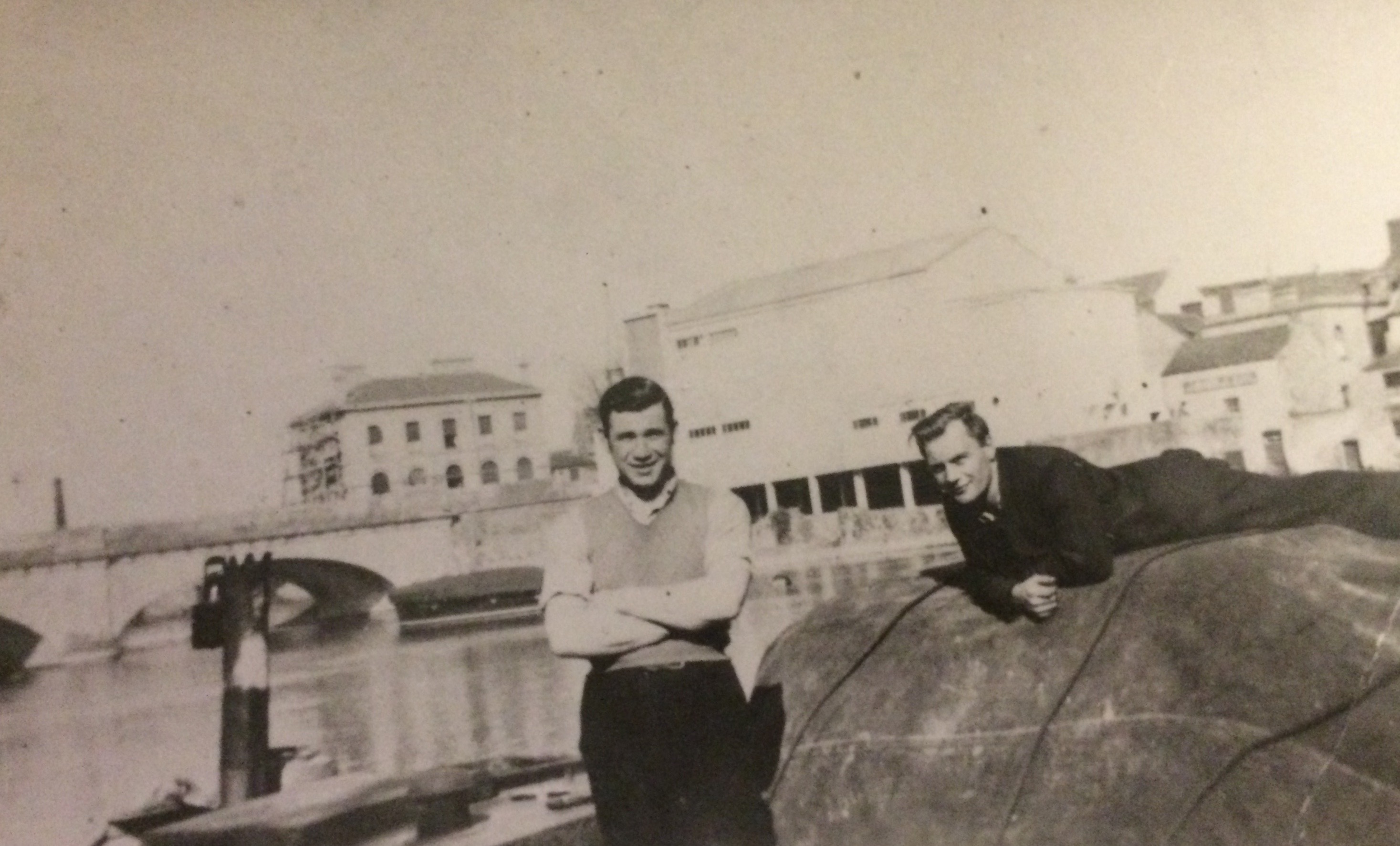Tom Nolan was born in 1922 in Rathangan, Co. Kildare. He followed in the footsteps of previous generations of his family who worked on the Canal and in 1940 started work with his Uncle Paddy, mostly drawing for Odlums Flour Mills. Tom started work for the Grand Canal Company in 1943. He came to Killaloe in the 1950’s, married and settled here until his death in 2005 aged 83.
You can listen to Tom’s full interview here through Soundcloud!
Tom was interviewed, along with approximately 80 other people living in Killaloe, Ballina and the surrounding areas, in 1992

Tom: A barge would leave Limerick on Thursday, they would have fifty tons of Guinness on board, and they would stop off here.
How often would you do that run?
Tom: A boat would leave Dublin twice a week for Carrick-on-Shannon and we travelled to Waterford and Carlow.
Would you stop over in those places?
Tom: We stayed over-night in those places. You wouldn’t travel on the lake, on the Shannon in the dark.
Why was that?
Tom: The lake was different, you couldn’t travel on the lake at night, you wouldn’t know where you were going. The Canal was different, you had locks and it was narrow – the lake you wouldn’t know where you were going on the lake at night.
Which was your favourite trip to do?
Tom: My favourite trip was to Limerick. The Upper Shannon was nice too, from Carrick-on-Shannon down to Waterford, down the Barrow.
There are loads of old stories about how the men got the Guinness out of the barrels. Would you be able to tell us anything about that?
Tom: No I couldn’t say anything about that …. (laughing)
How would you think the men would be today if they had to work on the barges. Would they be able to do it?
Tom: I don’t know, it was sort of a hard life, you know, in the Winter time, it was very tough because you were out in all weathers.
How often would you get home and how long would you be home for?
Tom: I was often a fortnight or three weeks away from home. You would be home then while you were down in Limerick for three days or maybe a week-end and then you would leave Limerick again and go back to Dublin again for another load.
Did you ever think of giving it up in all those years?
Tom: A couple of times I thought about retiring but things were sort of hard then and it was not easy to get work bar you went to England. I was reared on it all my lifetime and all belonging to me so I stuck on to it then. It was a very healthy lifestyle, you were out in all weathers.
What were the sleeping conditions like?
Tom: We had a cabin with four bunks for sleeping and a stove for cooking on.
What would you eat on board?
Tom: We would have bacon and cabbage and a pot of soup for dinner and a fry every morning, rashers, sausages and puddings.
Who would cook?
Tom: We all cooked, we all took our turns; we were all house-keepers as well. Earlier on when I was younger, I used to bake bread as well and you would have a hot cake for your breakfast. You would be up at six o’clock in the morning and bake a cake and have that for your breakfast.
Would there only ever be four of you on board at any time?
Tom: There was never any more than four people on board a barge at any one time, there was not room for any more.
Did you ever run into any trouble on the lake?
Tom: Coming down the lake like you’d have bad days on the lake.
If you had engine trouble, who would look after that?
Tom: Some of the running repairs on the engine we were able to do our- selves if it wasn’t too serious, otherwise we’d have to send for a fitter. You would ring up if you were broke down somewhere, or if you were broke down here, the Agent would ring from here. There was a fitter in Shannon Harbour and fitters in Dublin and you would get all your repairs done in James’s Street – that was the Head-quarters, you would get all your engine repairs done there.
The Company would pay for the repairs, the Grand Canal Company, it was a private company and in 1955 C.I.E. took it over and they maintained it until 1960.
Who were better to work for – the Grand Canal Company or C.I.E.?
Tom: We were getting better facilities with C.I.E., the money was getting better and we had a Union. We had a Union with the Grand Canal Company too, but then it was harder times. T’was good money I suppose. When I started first it was thirty six shillings a week for a deck hand; a Skipper had more, and the Engine man had more, they had two pounds ninety and seven pence, and then with the Union we started to get ‘rises’. We would have to look for them and the Union would get them for us.
Did you ever have any difficulty negotiating your wages?
Tom: We never had any problems getting our wages, there were stations along the way – you’d get paid here now in Killaloe if you were here of a Thursday evening and going out the lake of a Friday morning. Or you’d get paid on a Friday. There were stations – Shannon Harbour, Tullamore, Edenderry, Lowtown, you’d get paid in all them places. If you came of a Friday and you were passing through any of these places, you’d get paid there. There were good and bad times on the lake.
Did you have to wear all those oil skins? Were they all supplied for you?
Tom: We had to wear Oilskins then. We had to buy them ourselves, they weren’t that expensive, money was small but clothes weren’t that dear. In Dublin you would get them cheap in a place near the Ivy Market, Guinness’s used to have them, they’d leave them in and you could buy them. People used to make them themselves from linen and you could oil them yourself with Linseed oil, eggs and “all that”, steep them in it and dry them out.
Were they very cumbersome to wear on board?
Tom: When you were steering they were all right but when you were out at the Locks they were a bit cumbersome but still you would get around with them.
Did you ever have any trouble getting through the locks?
Tom: During the war years they were drawing timber, and anywhere it was being loaded, near locks on the canal, or where there would be a jetty, you might get trouble opening a gate, where blocks used to sink down behind the gates, we often got trouble that way, the gates would not open properly. We’d have to drag the block out. There was a Lock Keeper at every Lock.
Were the Lockkeepers on duty 24 hours a day?
Tom: They were supposed to be on duty twenty four hours a day, but sometimes at night you would be gone through before they’d be up, but the majority would be up at night all right.
Were there a lot of barges on the lake at those times?
Tom: The Canal Company must have had about sixty barges on the lake and there were private owners as well on the canal, they never worked down the Shannon here, they’d work on the Canal.

Tom: There was a boat lost, the 45M, on the 3rd December, 1947. It was coming to Limerick with a load of Guinness and I was on 72M with a load of oats from Ballinasloe for Limerick. It was a very wild day and we were in tow with the “St. James”, The Skipper was Paddy Lohan with Anthony O’Donoghue and Stevie Madden. The Skipper was going to bring us in to Garrykennedy, it was very wild, but I kept coming on the 72M. The 45M went in to Garrykennedy and the Skipper of the “St. James” said he would have to come after 72M, to see how we were getting on, and the boys in the 45M said they wanted to come to Killaloe too, so he brought them, and at Parker’s Point it was very wild, and the boat took in water, the waves went over it, she had a full load of Guinness and she took in water and sank.
Two men made their way to the shore, one man survived and the other was dead when he was got. There was one man ‘got’ six months after at Sally point, in June, the other man was never ‘got’.
We had no life jackets on board at that time, until after that we were supplied with life jackets, when the accident happened.
Did you have lifeboats?
Tom: No, we had no life boats.
Were the families of the men involved in that ever compensated?
Tom: No there was no compensation. The barge was full of Guinness but it belonged to the Canal Company – there was no compensation, no insurance, no nothing at that time, as far as I know. I don’t know now if they paid the expenses of the funerals for the families.

The 45M was built in Dublin in 1928 by Vickers Ireland Limited, for the Grand Canal Company.A short, steep ‘sea’ is the only term which describes the conditions which exist on the large Shannon lakes (both about 20 miles long and 4 to 7 miles wide) during winter storms. The Grand Canal Company barges crossed these lakes on schedule winter or summer. With a full load of beer, the cargo 45M was carrying, there was less than 18 inches of freeboard, yet she was the only one lost.
However, her story doe not end here. In 1975, 29 years after the 45M was sunk, it was raised by Mr. Donnacha Kennedy over a three-month period, assisted by spectators, family, friends, fellow boaters and divers and ninety barrels.The barrels were to supply the buoyancy to refloat the 45M.
Mr. Kennedy reports that his wife wrote a letter to CIE (who had bought the Grand Canal Company) making an offer for 45M “as is where is”. They fully expected this unusual enquiry to take some time to process but with surprising speed, they got a letter within ten days accepting.
Once raised, the single cylinder hot bulb semi-diesel Bolinder (1912 vintage) without an overhaul or even complete dismantling started and ran. Kennedy credits this to Swedish engineering. They unfortunately could not drink any of the 1,900 gallons of beer in the hold as it had not matured well over the 29 years!
Since 1975, 45M has re-crossed Ireland along the Grand Canal and is now fully restored.
Source: Donnacha Kennedy, http://heritageboatassociation.ie



